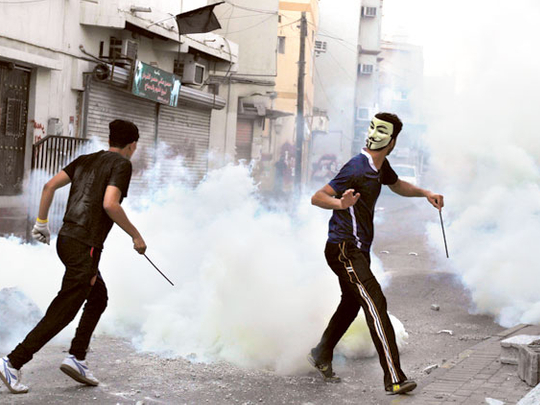
Manama: Bahrain’s interior ministry has rejected a Human Rights Watch report, saying that it was “contradictory, misinformed and incorrect”.
The ministry also accused the rights watchdog of failing to respect an agreement by publishing the picture of detainees it was allowed to interview.
The New-York-based NGO published its report at the end of a five-day visit to Bahrain on February 28.
In a long and searing statement, the ministry said it had arranged for the NGO delegates to visit Jaw Prison and police stations and temporary detention facilities.
The NGO representatives opted to see only the prison, the ministry said.
“The delegation was provided free and private access to detainees and permitted photography in the prison on condition that the pictures be used for human rights research only, and not be published or used for any other purpose that contravenes Bahraini law,” the statement said.
Sarah Leah Whitson, the head of HRW Middle East and North Africa division, and Jan Egeland, the Europe Director, were also given an interview with Shaikh Rashid Bin Abdullah Al Khalifa, the interior minister, the ministry said.
“On the last day of their visit, the representatives released a press statement making various allegations against the ministry, based on what the delegation claims it was told at the meeting. They also published photographs from their visit to the prison, contravening privacy and security conditions,” the ministry said.
“The press statement contradicts itself. It includes wrong information about important facts, including incorrectly representing or quoting officials. It also ignores the significant reforms that have taken place in the ministry since the report of the Bahrain Independent Commission of Inquiry (BICI).”
According to the ministry, “it was apparent at the meeting with the ministry officials that Human Rights Watch’s representatives had done little or no work beforehand to fully assimilate the BICI Report, much less to ascertain or understand the changes within the ministry and the reforms undertaken by the government of Bahrain since the publication of the BICI report.”
“They were even unaware of basic changes such as the appointment of a new chief of police in 2011. The delegation spent almost the entire meeting making provocative, accusatory remarks, and disregarding information provided by the most senior officials,” the ministry said.
Their unsupported allegations included suggesting that the ministry has “done nothing” by way of reform in the last two years, notwithstanding a briefing on the five BICI recommendations that concern the ministry, the statement said.
“Allegations were also made about a lack of accountability at the ministry. Following the unrest in 2011, a number of internal investigations were conducted, and certain high- and low-ranking police personnel were found to have acted contrary to written and verbal orders and rules on the use of force, which were clearly set out under Bahraini law.”
The ministry charged that the NGO disregarded information publicly available.
The ministry said that it rejected “the delegation’s inaccurate assertion that Bahraini police officers do not receive full and certified law enforcement training”. “A wide-ranging curriculum for police recruits and current officers is in place, and this aspect has received recognition from visiting human rights experts including more recently the office of the United Nations High Commissioner for Human Rights.”
The ministry said that it was “disappointed and saddened by the unsupported accusatory statements made by Human Rights Watch’s representatives”.
“It is apparent from their conduct that minds were made up prior to their arrival in Bahrain. This proved to not be a neutral fact-finding mission but a political action. It is not the first time that Human Rights Watch has failed to apply its professed high standards of objectivity and completeness. On a prior occasion, a Human Rights Watch representative admitted to the ministry that he had completed writing his report on Bahrain before arriving in Bahrain and was simply there for the formality.”
The ministry said that it valued the work of human rights organisations and NGOs in helping governments in their efforts towards reform “because they act responsibly and provide neutral observations and because they are not political actors”.
The ministry said that it had met and engaged with 11 other international organisations concerned with human rights over the last year and looked forward to continuing its policy of constructive engagement.












